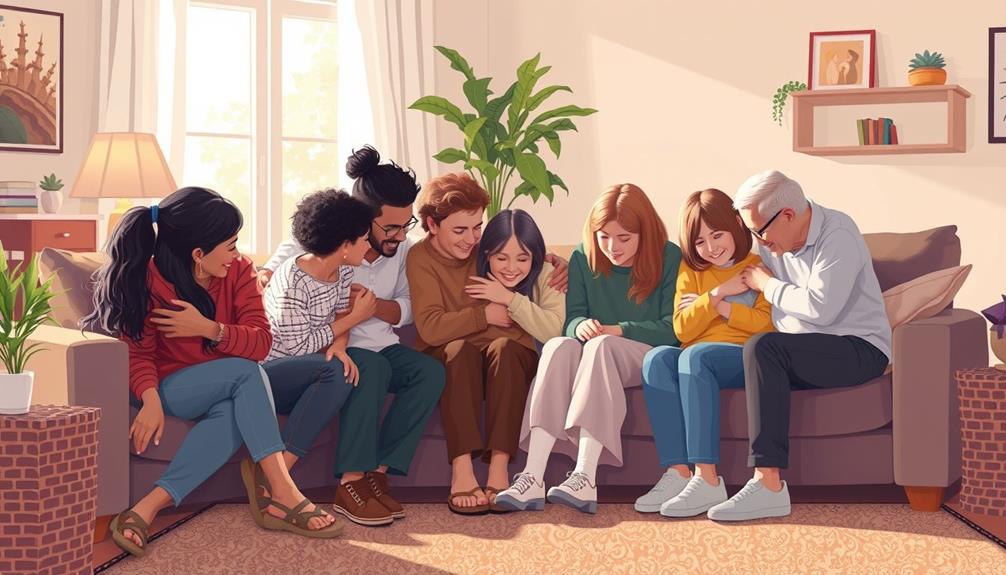Coping with loss while traversing Borderline Personality Disorder (BPD) can be overwhelming, as your intense emotions and fear of abandonment may amplify feelings of grief. You might experience rapid mood swings that complicate your ability to process sadness, anger, or confusion. Suppressing these emotions can lead to further internal turmoil and avoid healing. However, effective coping strategies exist, such as practicing Dialectical Behavior Therapy (DBT) techniques, engaging in mindfulness, or journaling to express thoughts and feelings. Surrounding yourself with supportive friends and professionals can provide the validation you need during this tough time. Exploring these strategies can help you manage your grief better.
Key Takeaways
- Utilize Dialectical Behavior Therapy (DBT) techniques to enhance emotional regulation and manage intense feelings during the grieving process.
- Engage in mindfulness practices and yoga to help ground yourself and reduce stress related to loss.
- Journaling can aid in processing emotions, allowing for reflection and understanding of your grief experiences.
- Establish a consistent daily routine to provide stability and predictability amid the emotional turmoil of grieving.
- Seek support from friends, family, or support groups to foster connection and validate your feelings throughout the grieving journey.
Understanding Borderline Personality Disorder

Understanding Borderline Personality Disorder (BPD) involves recognizing its profound impact on individuals' emotional lives and relationships. If you or someone you know has BPD, you might notice intense emotional instability that can make daily experiences feel overwhelming. This emotional rollercoaster often leads to rapid mood swings and impulsive behaviors, complicating your ability to maintain stable relationships.
People with BPD frequently grapple with a deep fear of abandonment, which can result in tumultuous interactions with friends, family, and romantic partners. This fear can heighten your experience of grief, especially when faced with loss. The pain of losing someone can feel magnified, as you may struggle to process emotions in a healthy way.
In fact, BPD symptoms can lead to self-destructive behaviors, and tragically, up to 10% of individuals with BPD may die by suicide. It's crucial to seek a thorough psychological evaluation if you think you have BPD.
Understanding this disorder is the first step toward finding effective coping strategies and fostering healthier relationships, ultimately allowing you to navigate the complexities of grief more effectively.
The Nature of Grief

Experiencing grief is a deeply personal journey that unfolds in various ways for each individual. For those with Borderline Personality Disorder (BPD), the grieving process can be particularly intense due to emotional instability and a profound fear of abandonment. This emotional distress often complicates how you navigate your feelings of loss.
Grief typically consists of stages—denial, anger, bargaining, depression, and acceptance. However, these stages may not follow a linear path for you, especially if BPD is part of the equation. To better understand the nature of grief, consider these aspects:
| Aspect | Description |
|---|---|
| Stages of Grief | Denial, Anger, Bargaining, Depression, Acceptance |
| Emotional Response | Grief reflects love, complicating feelings for those with BPD |
| Emotional Suppression | Common in BPD, leading to internal turmoil |
| Cultural Factors | Cultural detachment from death discussions adds complexity |
| Unique Experience | Each individual's grieving process varies considerably |
Navigating grief while managing BPD can feel overwhelming, but recognizing these elements can help you find a way forward.
How BPD Affects Grieving

Grief can become even more complicated when you have Borderline Personality Disorder (BPD). Your heightened emotional instability often leads to intense feelings of sadness, anger, and confusion during this challenging time. The fear of abandonment that accompanies BPD can further exacerbate your grief reactions, making feelings of emptiness and worthlessness feel even more overwhelming after a loss.
Individuals with BPD may also experience chronic feelings of emptiness, which can amplify the sense of loss and disconnection during grieving. Understanding the causes and risk factors associated with BPD can help you recognize these emotional challenges.
You may experience rapid mood swings, which complicate the grieving process and make it difficult to find a stable emotional ground. Complicated bereavement is more prevalent for those with BPD, increasing the risk of unhealthy coping mechanisms like substance abuse or self-harm. This emotional reactivity can trap you in a cycle of pain, leaving you feeling isolated and misunderstood.
Moreover, you might find yourself suppressing your grief, leading to emotional shutdowns that prevent you from expressing vulnerability associated with loss. It's essential to recognize these patterns as they can hinder your healing journey.
Understanding how BPD affects your grieving process can empower you to seek support and navigate your emotions more effectively, ultimately helping you cope with loss in a healthier way.
Effective Coping Strategies

Steering through the emotional turmoil of loss can feel overwhelming, especially for those with Borderline Personality Disorder (BPD). To cope effectively, consider incorporating Dialectical Behavior Therapy (DBT) techniques into your routine. DBT focuses on emotional regulation and interpersonal effectiveness, which are essential during the grieving process.
Additionally, utilizing practices such as yoga for back pain can promote overall well-being and help manage stress levels. Mindfulness techniques, like deep breathing and meditation, can help you manage intense emotions and find moments of calm amidst the chaos. Journaling is another powerful tool; it allows you to articulate your feelings and reflect on your experiences, facilitating emotional processing.
Establishing a consistent routine can provide the stability you need while maneuvering through grief. Structure helps ground you when emotions run high.
Don't underestimate the power of connection—engaging in support groups can be incredibly beneficial. These groups allow you to connect with others who understand what you're going through, fostering a sense of community and shared experience.
The Role of Support Systems

Support systems are fundamental for anyone journeying through the emotional landscape of loss, particularly for those with Borderline Personality Disorder (BPD). When you're dealing with grief, having family, friends, and professional therapists around can provide the emotional validation you need. They help you feel understood and accepted, which is imperative during such an intense time.
Engaging in support groups can further enhance your experience, as you connect with others who share similar struggles. This sense of community can greatly reduce feelings of isolation, making it easier to cope with your emotions. Furthermore, understanding the emotional impact of grief is essential for managing your responses effectively. Open communication within these support systems encourages you to express your feelings, which is crucial for processing grief.
Family members play a key role by validating your emotions, helping you accept and work through your grief. This validation empowers you to manage your emotions more effectively.
Additionally, incorporating professional therapy, such as Dialectical Behavior Therapy (DBT), can equip you with fundamental coping mechanisms and emotional regulation skills. Together, these support systems create a strong foundation, guiding you through the complexities of grief while steering through your BPD.
Conclusion
Maneuvering grief with BPD can feel like sailing a turbulent sea. Yet, just as a lighthouse guides ships to safety, strong coping strategies and support systems can illuminate your path. Embrace your emotions and reach out to those who care about you. Remember, even in the storm, you can find moments of calm and clarity. By acknowledging both your pain and resilience, you can steer through the waves of loss toward healing and hope.









